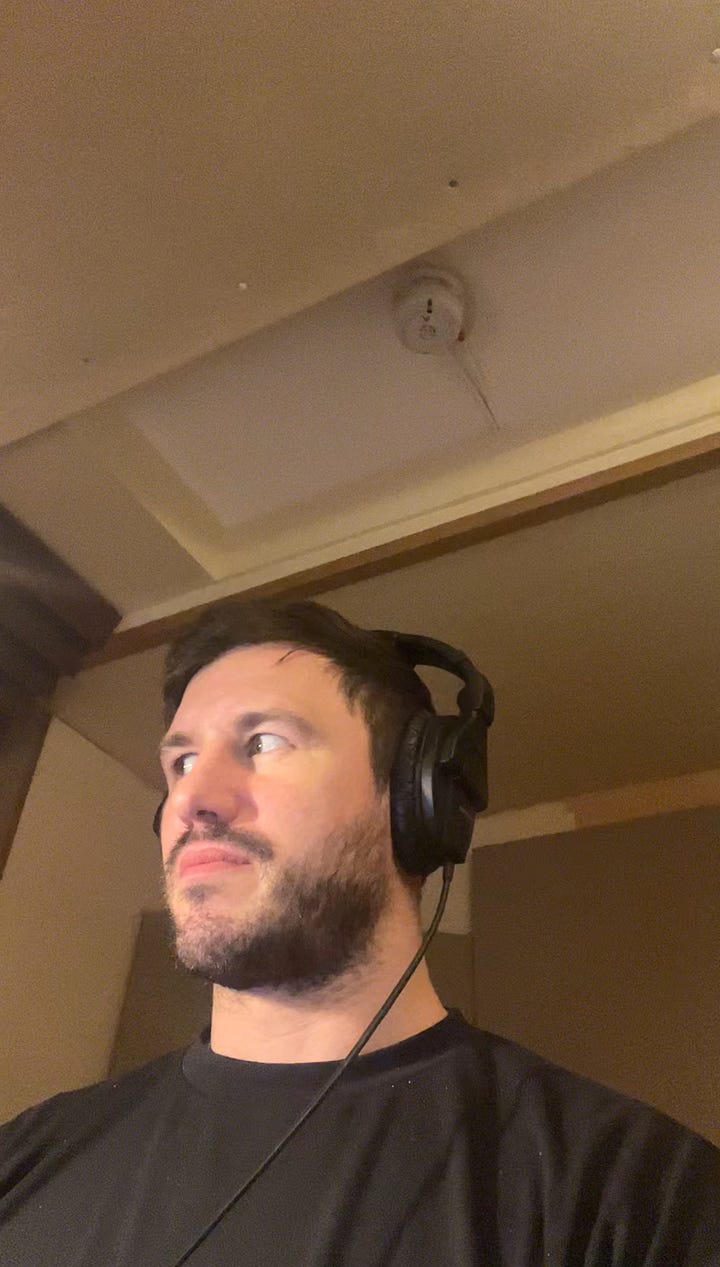the outlier
fictional worlds, the odyssey and no critique
hello,
I’m very envious of anyone enjoying some snow. I’m just cold.
This week I wrote a longish piece on Arsenal’s wonderboy Ethan Nwaneri and how we should think about developing talent. It includes a couple of personal stories from my rugby academy days, something I didn’t know about a great literary prodigy in Donna Tarrt and how tightrope walker Philippe Petit provides the perfect metaphor for improving our skills.
Paid subscribers get the relevant chapter from my last book Superstrengths included below the piece.
the books📖
It turns out audiobook work is perilous stuff.
I left my dwelling and like a questing knight I armoured myself against the pestilence that sweeps the land. I faced enemies both inside the castle and beyond the moat as people coughed and spluttered all around while I girded myself against them, protected only by my Uniqlo neckwarmer.


Fortunately the Japanese clothing manufacturer know their stuff and I reached the recording studio unharmed, only to find that my squires had been struck down before we were to do battle together, leaving just me and one engineer to record some children’s books that were, ironically or perhaps fittingly, about dragons.
We had a great time hammering out two children’s books and I’ll retrace my route to record another two tomorrow. It’s quite taxing work and until everyone I knew got ill, I hadn’t really considered how you do actually need to look after your health in the lead up to recording. Clearly I’d thought about it before but given the circumstances, like an athlete performing prehab I had to actually look after myself to make sure I didn’t present with some enormous cold.
This is definitely the kind of work I’d like to do more of moving forward but I wouldn’t want it to be my entire existence. It’s genuinely taxing stuff and sitting in a windowless room every day would be a bit much. Also, my various dragon voices would probably ravage my vocal cords before long.
for your interest
fictional worlds, the odyssey and no critique
fictional worlds
I’m often asked, ‘Why read fiction?’
There are plenty of provable and plausible reasons to read books in general but why specifically read fiction?
One answer I’m particularly keen on is perspective. If you spend the time it takes to read the book inhabiting the internal perspectives, the thoughts and feelings of other people, perhaps you end up developing empathy for those unlike yourself. Of course, this particular personal growth only occurs if you read books about people who are not like yourself.
This week I found perhaps a more interesting answer on Twitter from a writer called Visakan Veerasamy:
a lot of the world we live in is grounded in shared fictions. money, nations, laws and more are all fictions that people agreed upon. since our lives are governed by fictions; we might as well get good at navigating them. that and it’s also plain fun.
The idea that each story you read is a practice is a fun one. Your map of the world becomes more three dimensional each time you read a new book, showing you a topography previously hidden from you, filling in the blank spaces with colour and life.
Then there’s the idea that you can recognise fiction when you see it; an increasingly important skill. This week I found a story I’d choose to believe even if it wasn’t real.
During the German-Soviet war, there was a Red Army soldier who sang each night with a hauntingly beautiful voice. His comrades would give him their tea rations and scarves to protect his larynx. One night, he couldn't sing because he had gotten sick. A German soldier crawled across no-man's-land and tossed something into the Soviet trench and the Soviet soldiers thought it was a grenade. It was a package containing a letter asking if the singer was okay and if he needed medicine.
Supposedly he was named Vasil Badulia and while the story has the whiff of internet unbelievability, if he didn’t exist, this is the sort of fiction I’m happy to believe.
the odyssey
I can feel myself again pulled towards the old myths and I’m not the only one. Christopher Nolan has announced his next film will be The Odyssey. How such a realistic director brings the monsters Cyclops, Scylla and Charybdis, as well as the various Olympian Gods, to the screen remains to be seen.
And on screen right now, aside from Wallace and Gromit (and The Traitors which I love), I can highly recommend the second series of SAS Rogue Heroes, the BBC adaptation of Ben MacIntyre’s book of the same name. The second series follows the nascent SAS regiment out of North Africa and over to Europe as the war moves to Italy, and while the show does have a wham bam thank you mam style with its punk music and boys on tour attitude, this isn’t merely an affectation but a fact.
A friend of mine found the show bothersome, saying they felt it glorified war, but MacIntyre’s book explains this is who these people were. In this account, the SAS’s first ever doctor shows up to meet the men for the first time:
Pleydell had been expecting a man of blood and steel, a ruthless trained killer; instead he had been made to feel as if he had just joined a particularly jolly beachfront house party, with bombs. These men were ‘risking their lives in particularly daring and spectacular fashion’, but acting as if ‘the whole thing was a glorious rag’.
Extreme circumstances are sometimes best served by extreme people. These people became our heroes and, like Odysseus and Achilles, Homer’s great Greek protagonists, they are not necessarily good men or suited to life beyond the battlefield. By refusing ourselves these stories like my friend, we might be creating conditions that mean these people never now arise. As CS Lewis said,
Such is the tragi-comedy of our situation — we continue to clamour for those very qualities we are rendering impossible. You can hardly open a periodical without coming across the statement that what our civilization needs is more ‘drive’, or dynamism, or self-sacrifice, or ‘creativity’.
I’ve spent more time reading periodicals than I should over the past week and Lewis’ words ring true to me. Perhaps it’s not the monsters that Nolan will have trouble rendering on screen in his Odyssey.
We’re used to seeing monsters. We struggle to see heroes.
no critique
Last year at a book launch someone came up to me, told me they’d seen my book content and during a convivial conversation they asked me politely, ‘Why don’t you criticise stuff?’
My answer was that there’s enough negativity online and I’m happy not to contribute to it, in short form manner at least. I’m happy to be critical in a more discursive forum but I’m not interested in saying, ‘This is bad’ and leave it at that. Too many people do this – it’s rude and stupid.
Partly, my stance stems from fear. Expressing the ‘incorrect’ opinion online can lead to pile ons and even without being particularly edgy, I’ve had a few antagonistic comments on my posts that I’ve met with a mix of nonresponse, pisstakery and immediate blockage.
But if I get politely expressed pushback, I’m happy to engage with it. Part of my former life in rugby relied on honest feedback and criticism and in fact if you didn’t get it, you and the entire team would be much worse off. A world champion athlete I met recently explained his blunt but fair communication style to someone of my now softened civilian status that as an individual athlete, success or failure were borne by him alone and he refused to compromise his chances for the sake of someone’s feelings. This is something that’s easy to say you will do but much more difficult to keep up (and to remain on good terms). It might be the great skill of the high performer.
This piece by Sean Delone exists to review Sally Rooney’s Intermezzo but by referencing a number of different artists and groups it makes a great case that,
Rendering no judgement is infantilizing to a great artist (a great athlete, a great whatever…), not an expression of love. If an artist can do no wrong, then how can their achievements of genuine greatness be properly appreciated?
How indeed. Perhaps I am being infantile. Please don’t criticise me for it.
a book
I very much enjoyed Fathers and Sons by Ivan Turgenev.
To begin with, I felt the translation by Richard Dearborn was too modern, the speech in particular hard to place in 19th century Russia. I quickly got into the book and aside from the odd ‘mate’, found it to be not a problem. As ‘great’ Russian literature goes it’s very short, only around 200 pages, and I’d recommend it as a gateway read if you’re yet to tangle with Tolstoy and the gang.
As the title suggests, the story portrays a generational conflict between the older and the younger generation; the elders wearied somewhat by the world while the youth are full of new ideas and revolutionary brio. The book treats the two sides with equal seriousness but more crucially, with equal sympathy when the world inevitably makes mockery of them.
a listen
I saw someone say that there are no 10/10 albums. I’ve got one right here.
Let me know yours in the comments!
a quote
It’s people’s duty to live by learning something. If people think they have learned enough then they’re dead.
– Yohji Yamamoto
lastly
Thanks for reading! My work is made possible by you so if you’d like to support me you can buy my books, hire me to do something or you can become a paid subscriber using the button below.
If you want to help me out for free, you can share this letter with someone who might enjoy it, either on social media or by directly sending it to them using the button.
I’ll see you next time.



I’ve also been thinking about Nolan and how he’ll bring the Odyssey to film. To your comment, I think he’ll do the hero story well and could show us a more human representation of the mythical characters/monsters. I’m curious if he’ll take a similar approach as he’s done with some of his previous main characters, especially in the themes of facing the odds, appearance vs. reality, and grounding them to something real. The Protagonist in Tenet, Cooper in Interstellar (even Mann) and Cobb in Inception all come to mind. In each of these stories, the more abstract (almost mythical) characters or objects had some human connection in a high stakes situation - The Protagonist working against time to stop total annihilation, the 4th dimensional beings creating the tesseract to save the human race, Cobb having to travel an idea from inception to reality while facing most of the journey in the subconscious state. All while deciding what kind of person each of them wanted to be. I’m keenly tuned in to see his take on Odysseus. And with Matt Damon playing the character, I think we’ll definitely see the struggles and perseverance of a hero with all the Nolan nuances.
Solid album choice by the way.